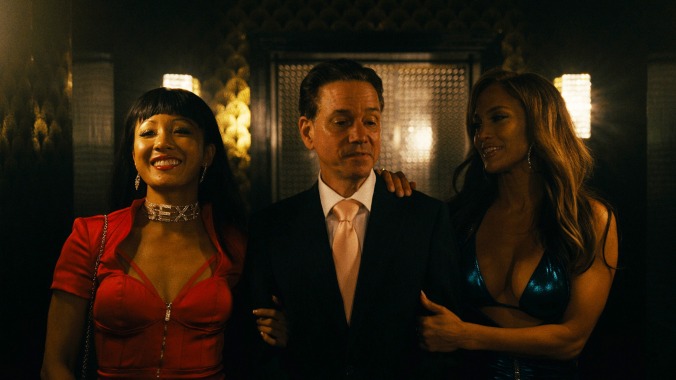Jennifer Lopez gives her best performance in years in the surprisingly bittersweet Hustlers

Dorothy (Constance Wu) makes her living as an exotic dancer, climbing into the laps of Wall Street types and seducing them into buying plenty of drinks—and leaving plenty of tips—under her alias of Destiny. But Hustlers writer-director Lorene Scafaria is interested in a different sort of intimacy: Her camera seems to capture just about every time Destiny touches hands with her more experienced co-worker Ramona (Jennifer Lopez). Hustlers isn’t a love story, not even a platonic one. But Destiny is still starved for affection, connection, or any form of non-transactional contact, really. So she’s especially receptive to being taken under Ramona’s wing—or, in this case, her fur coat, under which the two women huddle during a rooftop smoke break.
It’s only after this bonding session that Scafaria introduces her framing device: In 2014, seven years after the events of the film, a reporter (Julia Stiles) is interviewing Destiny. These scenes are framed with static, antiseptic one-shots, a clear contrast with the energy of the club scenes. Over the course of their conversation, it becomes clear that while her profession isn’t exactly nonstop glamour, Destiny is describing her good old days, as her friendship with Ramona tightens and she gets to know her exuberant co-workers (including slightly distracting bit parts for pop superstars Lizzo and Cardi B, the latter of whose pre-fame life has some interesting parallels to the film). But sex work isn’t immune to economic collapse, and in the aftermath of the 2008 financial crisis, Ramona introduces what she initially calls a “side hustle”: Stepping outside the strip club to recruit wealthy customers—and then drugging their drinks to ensure good feelings, an open wallet, and zero memories of why, exactly, thousands of dollars have been charged to their accounts.
With only lingering morning-after embarrassment and the general impression of being shown a great time, men hardly ever press the issue. Soon Destiny is in on the hustle, alongside Mercedes (Keke Palmer), Annabelle (Lili Reinhart), and their den-mom ringleader. Liberated from the grind of nightly dancing, the four women start raking in money and become, yes, a makeshift family. Newly liquid, they perform luxury imitations of domesticity, like a warm Christmas gift swap replete with Louboutins, chinchilla jackets, and Barbie Dreamhouses for the kids. The reporter’s presence lingers over these scenes; clearly something is going to give.
Nearly as inevitable as the scheme eventually going wrong are the comparisons to Martin Scorsese, contemporary maestro of good-time criminality chased with kinetic bad-time shenanigans. Scafaria’s cutaways and narrated procedural rundowns don’t have the electricity of prime Scorsese, but her filmmaking has its own sharp wit—like her repetition of a whip-pan revealing, over and over, the ladies making a dramatic entrance, marching toward both the camera and their finance-bro prey. Palmer and Reinhart also don’t have much to do beyond the single running gags parceled out to each of their characters, but Scafaria knows exactly how to key into Destiny’s headspace. With a couple of long following shots, one at the beginning and another toward the end, she distills a litany of details about the character’s experiences into mere minutes of screen time.
Wu is so empathetic in these scenes, in fact, that sometimes Destiny’s moral clarity starts to look a little sugarcoated. She’s always the one emphasizing how she doesn’t want to hurt anyone, a stance that the movie only lightly interrogates, as when Ramona suggests bringing in some women with sketchier rap sheets to help their operation and Destiny replies that they shouldn’t associate with criminals when breaking the law. A more shaded and somehow also showier performance comes from Lopez, who has not always been well-served by her thriller and rom-coms roles. Here, however, she has a rangier opportunity, drawing upon her background in dance, her movie-star charisma, and her Out Of Sight grit. It’s easily one of her best performances.
Hustlers has plenty of direct commentary on financial desperation, and little of it is especially enlightening. As a statement about how Wall Street financiers are the real criminals, and America is one big strip club, it’s less sly or immediate than Magic Mike or The Girlfriend Experience. But that’s not really what Scafaria is after here. She’s interested in locating the aching loneliness beneath her characters’ criminal desperation—particularly Destiny, whose hunger for a sense of security and belonging lingers through the movie’s final stretch. Plenty of crime capers end ruefully, but few feel this potently bittersweet.